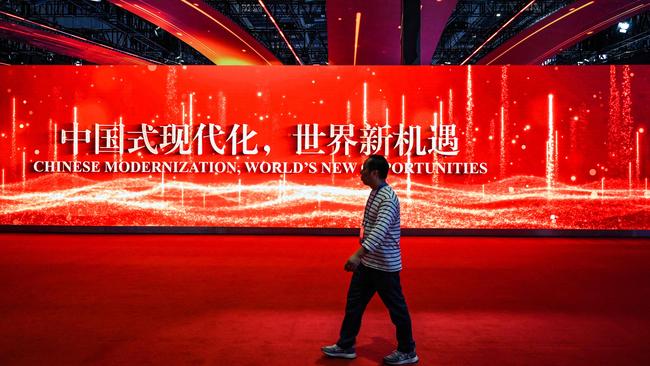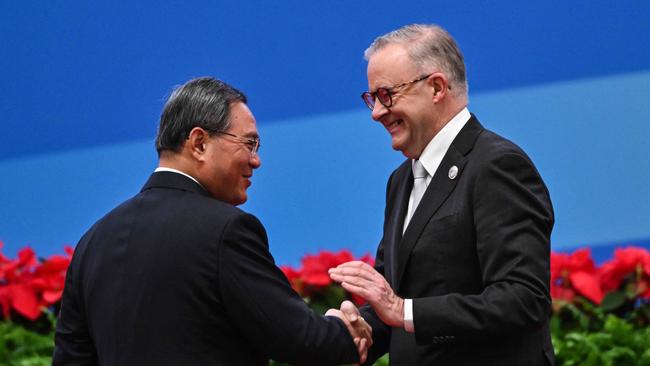Better Canberra-Beijing relations face challenge of US presidential race’s repercussions
While Australia-China trade relations are better than they have in years, the US presidential election campaign could affect this nation’s links with our largest trading partner.

While Australia-China trade relations are looking better than they have in years, there is rising concern about how the US election campaign could affect Australia’s links with its largest trading partner.
The record attendance of more than 250 Australia companies at this year’s annual Chinese International Import Expo (known better by its acronym CIIE) in Shanghai is a sign of a much improved Australia-China relationship – despite the inevitable prickliness over specific issues.
The week has seen a high level business delegation visiting Beijing, led by the Australia China Business Council which included Rio Tinto chief executive Jakob Stausholm, BHP Australia president Geraldine Slattery, Cochlear CEO Dig Howitt, Fortescue chief executive Dino Otranto, King & Wood Mallesons CEO partner Renae Lattey, Macquarie Bank’s China country head Thomas Horn, and ANZ’s China country head Chris Raciti.
Others include Woodside’s chief representative in China, Craig Pasch, the chief financial officer of the Port of Melbourne, Leigh Letschel, as well as ACBC national president David Olsson and CEO Tom Parker.
The attention then shifted from Beijing to CIIE in Shanghai where the Australian delegation was led by Trade Minister Don Farrell who met up with Chinese Commerce Minister Wang Wentao.
Treasury Wine Estates was an enthusiastic participant having two different stands at the expo, one for its up-market Penfolds brand (a favourite in China) and another for its more regular brands such as Rawson’s Retreat.
TWE took advantage of the expo to sign an agreement for the development of wine making talent in China, with TWE chief Tim Ford welcoming the move saying his company was proud to play its part in the development of the Chinese winemaking industry.
TWE was represented by Penfolds chief executive Tom King and its China based executives.
Other corporate leaders attending CIIE included the chief executive of the now privately owned Blackmores, Alastair Symington.
While corporate leaders and Farrell himself were enthusiastic about the event, it was a sign of the times on the Chinese side that the populist Global Times gave the Australian attendance a glowing coverage with an article headed, “Australian companies embrace opportunities at CIIE”.
It quoted Wang as saying the record attendance at CIIE by Australian companies “underscored the strong confidence and enthusiasm of Australia’s business community for deepening economic ties with China”.
Wang said China’s positive economic momentum would create more opportunities for Australian companies, expressing the hope that Australia would continue to improve its business environment and “treat Chinese companies fairly”.

On the one level this week’s events represent another high point in the repairing of relationships which deteriorated under the Turnbull and Morrison Coalition governments, leading to Chinese trade restrictions on some $20bn of Australian exports including barley, wine, lobsters, and coal.
The election of the Albanese government in 2022 paved the way for a steady improvement in ties with China with the gradual unwinding of almost all trade barriers.
Equally as significant was the willingness of the Chinese side to drop its previous approach of wolf warrior diplomacy and respond positively to the change in government in Australia.
Behind the scenes, as one visiting economist from China said recently, has been a realisation on the Chinese side that aggressive diplomacy does not work.
But more importantly China has been bracing itself for a return of a trump Presidency, repairing ties with trading partners such as Australia.
In short, China has realised it cannot continue to fight diplomatic wars across a range of fronts when it may have to deal with an aggressive Trump presidency.
The question for Australia is how to navigate the challenge of dealing with China in a potentially more aggressive Trump-led US.
Under the original Trump presidency, the Morrison government’s hard line stance played into anti-China rhetoric of the US administration.
If Trump wins, his hard line stance against China will inevitably influence the debate in Australia.
Trump has threatened to impose tariffs of up to 60 per cent on goods from China. But how this plays out in practice will remain to be seen.
Many US companies, including Trump supporter Elon Musk, have strong ties with China and may prove to be a moderating force on some more hard line measures.
In theory, a high tariff wall in the US could see a much slower economy in China which could reduce demand for Australian goods including iron ore, LNG and coal as well as food.
But there are reports that the Chinese government is ready with stimulus measures if needed to offset any negative impact from the Trump tariffs.
While a Harris presidency would not impose across the board tariffs on goods from China, she is expected to follow President Biden’s policies of targeting specific sectors of the Chinese economy, particularly the tech sector, with trade measures.
The Biden administration has not been a belligerent as Trump in its language but it has not unwound some tariffs and it has moved to de-risk its supply chains by encouraging more US investment in green energy and tech.
As research officer Corey Lee Bell and analyst Elena Collison point out in a new paper for the Australia China Relations Institute (ACRI) at Sydney’s UTS, under Biden “the US has worked to de-risk supply chains and out-compete a rising PRC in green energy technology and semi conductors”.
“Key symbols of this have been the passing of the Inflation Reduction Act and the CHIPS and Science Act,” they say.
“While these pieces of legislation aim to strengthen technological sovereignty, this agenda has been balanced by friendshoring provisions and a commitment to advanced tech collaboration with key allies, most prominently Australia and the UK through AUKUS and Japan and South Korea through a reinvigorated trilateral partnership.”
While Harris’s policies on China are not clear, they could be expected to be an evolution of the Biden stance.
Australia’s challenge will be to continue to foster business ties with China as a result of the improved political relationship between Canberra and Beijing, where the business and economic ties advantage both sides, while dealing with the hard line policies from Washington.
Whoever wins the election, the Australia-China relationship is set to come under new challenges as the new president asserts on the global stage.




To join the conversation, please log in. Don't have an account? Register
Join the conversation, you are commenting as Logout